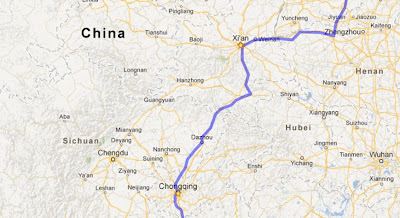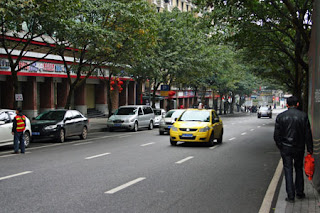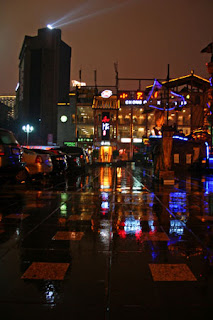 |
| 418 miles approx |
Having arrived at Xi’an railway station by the skin of my
teeth, I got through the ticket check, the x-ray machines and the cursory body
search, which is standard at every railway and subway station; I limped to the
waiting room with my exploding bags to join the queue of a 1000 people, around
six from the back. The waiting room was hot and stinky and I was properly
flustered for the first time during my trip. This should have been a sign of
what was in store.
Like a good, organised, sensible, mature, dull traveller, I
had pre-booked all of my train tickets leaving nothing to chance, due to the
fact that it was Chinese New Year and I had been advised not to attempt any
sort of train travel in China during this time as it is the biggest annual
mass human migration on earth. Some of my train tickets had been altered
slightly due to the sky-high demand and this particular ticket had been changed
from a ‘soft’ (1st class) to a ‘hard’ (2nd/3rd
class). I hadn’t realised that there were soft/hard sleepers and soft/hard seats.
I had been seriously downgraded from a soft sleeper to a hard seat. As I
boarded the train I looked into the carriage and my heart sank as I saw that we
were in a seated car and I realised that I was going to be sitting bolt upright
in a ninety degree chair for the next fourteen hours. I found my seat which was
in a square of eight. In our square were ten people. Knee to knee, shoulder to shoulder,
disappointment to despair. I took my seat with as much bonhomie as Hitler
presenting Jesse Owens with a gold medal.
I found these pics to give you an idea.
In this situation you cannot move as a) there is no room
once all of the people have taken up every inch of space with both baggage and
themselves (my block had a mum and two teenage sons sharing two seats and
opposite there was a family of six grown men sharing four seats and beside me
was a carousel of around five people who all seemed to be sharing one ticket)
and b) if you do move, your seat gets stolen. I saw it happen a dozen times. It
was hot, it was loud, it was stinking and all around me people were shouting
and hacking and men were coming into the carriage mistaking it for an East End
market, selling belts and whirligig plastic lights and raffle tickets and various other types of cack, whilst
shouting/screaming their patter endlessly over the incessantly loud cheap pop
music that always seems to be pumped through Chinese train speakers at all
times of day and night. Every half an hour or so there was also a trolley of
overpriced pot noodles, drinks, fruit or slop that you could buy if you suddenly
felt the urge to sit down to a nice meal.
This was hell squared.
The night passed as slowly as a sloths metabolism and each
and every tiny piece of my body hurt. Sitting still and upright for hours is much more
uncomfortable than you can ever imagine. Also the tiredness was overwhelming,
but sleeping in a ninety degree chair in those circumstances is not possible. I
half expected orange boiler suits and pre written confessions to be handed out (for the record, I would have signed).
Interestingly the only things bought from the drinks trolley
were bottles of water or flavoured bottled tea. There were young groups of men
everywhere and not a drunken lout in sight. This is in sharp contrast to
travelling by rail in the UK. Even though it’s total carnage on the trains it’s a true reflection of the country in which it’s travelling through. In China, with
its enormous population, you’d expect overcrowding on a train during the
holiday season; with plenty of food, chatter, tea drinking and close human
contact. In Britain, with it’s supposed civilised society, during any sporting
event that culminates in people taking cabs or public transport, you expect
drunken idiots breaking the law and/or harassing people and generally behaving
like westerners assume ‘less civilised’ societies behave. Even though in
terms of comfort that train was hellish, I felt much safer than I ever have on
an equivalent British train journey.
The Chinese eat these 30p pot noodles when travelling on a train. They are surprisingly tasty and spicy. Better than the UK versions. Although adding the tube of spam (?) that comes with it is not recommended.
As morning broke I
noticed that the scenery had changed into sublime conical mountains-in-the-mist,
exactly the kind of scenery you think of when imagining China, but I was
powerless to take any photographs on account of being paralysed from the
eyelashes down and non-operational from the eyelashes up. We were chugging through karst landscape which is common in this area, stone forests, collections of peaks, limestone caves and valleys. The Yangtze River runs through the whole area from west to east covering a course of 6650km, cutting through the Wushan Mountains at three places and forming the well-known Three Gorges dam which is the world's largest power station in terms of installed capacity. It is also a controversial issue - the dam flooded archaeological and cultural sites and displaced some 1.3 million people, and is causing significant ecological changes, including an increased risk of landslides.
Also, as we were now entering a sub-tropical climate, we were heading into rice-growing territory and to match the shapes of the mountains I saw Chinese farmers wearing straw conical hats whilst working in the green scenery. It was beautiful and truly a sight for very sore eyes.
I was eventually spewed from the train in a sweaty, ashtray smelling heap, feeling like I’d been put on a slow cycle in a dustbin. I found the taxi rank with traffic cops and meters and nicely dressed drivers and instantly felt even grubbier, if that were possible, and took a cab to my hostel. I put everything in the laundry, put myself in the shower, had a massive bottle of beer and, feeling like a Somme survivor, slept until early evening.
Also, as we were now entering a sub-tropical climate, we were heading into rice-growing territory and to match the shapes of the mountains I saw Chinese farmers wearing straw conical hats whilst working in the green scenery. It was beautiful and truly a sight for very sore eyes.
I was eventually spewed from the train in a sweaty, ashtray smelling heap, feeling like I’d been put on a slow cycle in a dustbin. I found the taxi rank with traffic cops and meters and nicely dressed drivers and instantly felt even grubbier, if that were possible, and took a cab to my hostel. I put everything in the laundry, put myself in the shower, had a massive bottle of beer and, feeling like a Somme survivor, slept until early evening.
Not one of my, obviously!Chongqing bears a resemblance to Manhattan.
I awoke in a better state of repair and ready to see what Chóngqìng
had to offer. What I found was a delightful riverside city that was reminiscent
of Manhattan – tree lined roads and yellow cabs and skyscrapers. This was in
lovely contrast to the dreary drudgery of Xi’an and it was refreshing to be
near water again (even though it was the colour of the dregs of a carpet
cleaner).
Ah! A good coffee at a swish streetside coffee shop. I've missed this!
20p for a big chunk of pineapple or a stick of sugarcane.
The daily paper in the city centre.
I was staying in a stilt house set in the cliffs at the
confluence of the Yangtze and the Jialing rivers. The city is unusual in that
it’s built steeply in terraces on a mountain. In order to get to the next
street up from me I had to take three escalators, a lift up nine floors and
another two escalators. No bikes here!
The escalators inside the stilt building
If you can imagine a cross between
Manhattan and Spaghetti Junction, you’ve got Chóngqìng.
You need to use the elevators and escalators in this building, the Huadong Caves, to climb to the next street.
Sincerely hope that this wasn't gourou because it was TASTY.
Dog meat (Chinese: 狗肉; pinyin: gǒu ròu) has been a source of food in some areas of China from around 500 BC, and possibly even earlier. Researchers in the Royal University of Technology theorized that wolves in southern China may have been domesticated as a source of meat. Mencius, the philosopher, talked about dog meat as being an edible, dietary meat. Dog meat is sometimes euphemistically called "fragrant meat" (香肉 xiāng ròu) or "mutton of the earth" (地羊 dì yáng) in Mandarin Chinese and "3-6 fragrant meat" (Chinese: 三六香肉; Cantonese Yale: sàam luhk hèung yuhk) in Cantonese (3 plus 6 is 9 and the words "nine" and "dog" are homophones, both pronounced gáu in Cantonese. In Mandarin, "nine" and "dog" are pronounced differently).
The eating of dog meat in China dates back thousands of years. It is thought to have medicinal properties, and is especially popular in winter months, as it is believed to generate heat and promote bodily warmth. The meat is popular in Guangdong and Guangxi whence it went on the menu for Chinese astronauts to consume in outer space. Historical records have moreover shown how in times of food scarcities (as in war-time situations), dogs could also be eaten as an emergency food source.
But while remnants of this tradition remain in certain quarters of Chinese society, the degree to which it is deemed to be socially acceptable has now become contested, with Chinese animal groups and pet-owners increasingly speaking out against the practice. Controversy has centred particularly on the cruel and inhumane treatment of dogs prior to their slaughter, with allegations having surfaced that these animals can at times be skinned while still alive. Most notably, a series of events that occurred in various parts of the country in 2012 have raised further awareness on this issue in the mainland, with local and international news media having reported on how Chinese denizens and the Chinese police had been intercepting trucks transporting caged dogs to be slaughtered in such localities as Chongqing and Kunming. The movement against the consumption of cat and dog meat was given added impetus by the formation of the Chinese Companion Animal Protection Network (CCAPN), a networking project of the Chinese Animal Protection Network. Expanded to more than 40 member societies, CCAPN in January 2006 began organizing well-publicized protests against dog and cat eating, starting in Guangzhou, and following up in more than ten other cities "with very optimal response from public."Before the 2008 Beijing Olympics, Chinese officials in Beijing ordered dog meat to be taken off of the menu at its 112 official Olympic restaurants in order to not offend visitors from various nations who would be appalled by the offering of dog meat at Beijing eateries.
From January 2007, more than ten Chinese groups joined an online petition against the consumption of cat and dog meat. The signatures indicate the participants will avoid eating cat and dog meat in the future. The petition received more than 42,000 signatures from the public out of a population of over one billion, and has been circulated around the country.
Some Chinese restaurants in the United States serve "imitation dog meat", which is usually pulled pork, and purportedly flavoured like dog meat, e.g. "Northern Chinese Restaurant", in Rosemead, California. These restaurants do not serve genuine dog meat.
In China, draft legislation was proposed at the start of 2010, which aims to prohibit the consumption of dog meat. The legislation, however, is not expected to be effective, despite officially outlawing the eating of dog meat if it is passed. On 26 January 2010, the first draft proposal of the legislation was introduced, with the main reason for the law reportedly to protect the country's animals from maltreatment, and includes a measure to jail people who eat dog for up to 15 days. However food festivals continue to promote the meat. For example the 4th annual Yulin, Shaanxi food fair that took place on May 29, 2011 spanning 10 days consumed 15,000 dogs. (Wikipedia)
Syrup bread
My hostel was in this building, overlooking the Jialing and Yangtze rivers, two of 50,000 rivers in China.
Chóngqìng is a city
that really knows how to do shiny lights. Everything comes to life at night
when most buildings use low key LED’s to subtly accentuate their existence.... ahem.
Saturday was Chinese New Year’s Eve, and the hostel made
merry with home-made dumplings (to which I am unashamedly addicted and will eat
five times a day if possible), wine and cocktails.
My raffle win :)
As midnight struck, we exhibited our sobriety by running
outside with logs stolen from indoors (at the behest of Steven, the hostel
manager - he claimed it was traditional?!) and setting off fire
crackers in the street, to coincide with the entire country letting off
fireworks, the likes of which you’ve never seen.
Not drunk. Not us. Nope.
Alex - centre
Steven the hostel manager, on the left
The following day was a very slow start, but I made the
effort to get up and walk along the river. It seemed that the whole town had a
day off and as it was such a lovely sunny day, everyone was out for a walk. I
decided to take a mini cruise along the Yangtze as that involved a hair of the
dog and nothing more strenuous than sitting down. I sat with a Chinese family
from Guilin who were on holiday for the Spring Festival and were eager to
share their snacks and weren’t bothered about making too much conversation.
Fine by me.
Riverside dining
Like a troubled bridge over water...
I think that the boats chartered to provide these pleasure
cruises must be former spy boats due to their being so understated as to be almost invisible…
My visit to Chóngqìng was very brief and very shiny. I
really liked the cosy feeling city and would be very happy to return.

























































